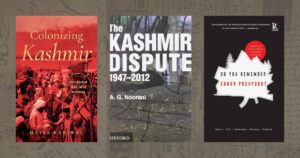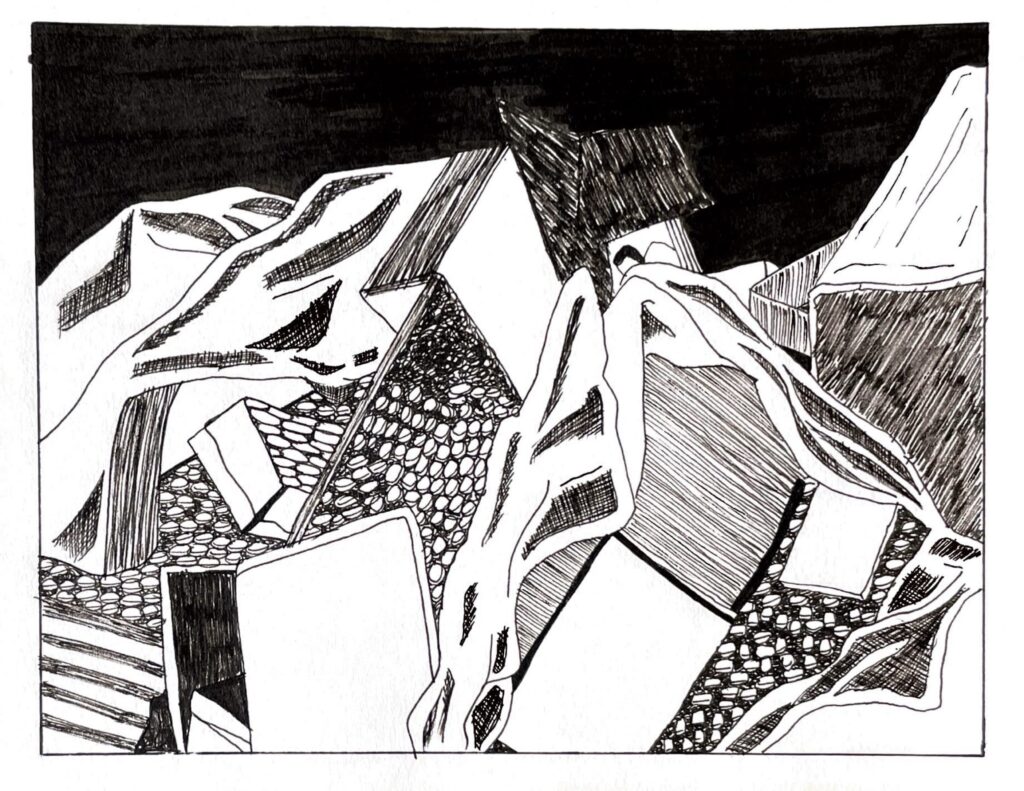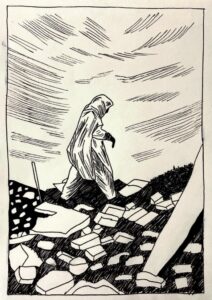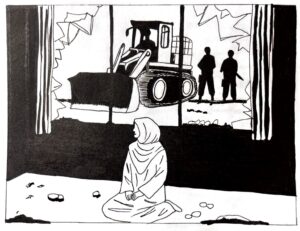
Bulldozed by authorities in India, how this Best Bakery refused to live under rubble, carved a path to resistance

The latest in our Profiles of Demolition follows Madhya Pradesh’s Amjad Khan whose business came under multiple attacks from the authorities amidst spiraling anti-Muslim violence. But his turned out to be a story of resilience in the face of collective punishment
For fifteen years the aroma of warm bread, the gentle rustle of wrappers, and the rhythmic clatter of trays filled the modest storefront of Best Bakery. Nestled in the outskirts of Khargone in the central Indian state of Madhya Pradesh, the bakery stood as a popular establishment and the manifestation of a quiet, stubborn dream. Amjad Khan, a 48-year-old father of six, had built the business brick by brick and rupee by rupee, with borrowed money from friends and relatives who believed in his vision. His father had also been in the same line of work, but Khan had turned a humble shop into what he proudly called a chhoti factory. The “small” factory, at its peak, involved nearly one hundred individuals, through direct employment or otherwise.
Khan’s reputation went beyond that of a businessman. People in his neighborhood and beyond knew him as someone who “always helped.” In moments of crisis, thus, they instinctively turned to him. During the Covid-19 pandemic, when many withdrew into their homes in fear and uncertainty, Khan was out on the streets organizing the distribution of rations, helping families access medical care, and even arranging legal aid for young boys who had been arbitrarily picked up by the police after the Ram Navami Violence. The youth, particularly Muslims, are often subjected to arbitrary arrest after a communal clash. He also supported other bakery owners and small traders despite competition, often telling them, “Rizq to Allah ki taraf se hai,”—sustenance comes from Allah. There was no space for envy or rivalry. His generosity, quiet and consistent, earned him respect across Khargone. Often, he was invited by the district administration to be part of peace committees ahead of religious festivals to ensure communal harmony in the city. But it all kept him under the state’s watchful eyes, too.
On April 10, 2022, Khargone witnessed an outbreak of violence during a procession on the occasion of Ram Navami, a Hindu religious festival. The procession began in the morning and intensified through the afternoon. The rally, which included bikes and trucks with mounted loudspeakers and men waving saffron flags, passed through communally sensitive areas like Talab Chowk. Provocative slogans and songs were played at high volume—consistent with the shrill, anti-Muslim rhetoric of the Hindu right. Despite prior intelligence warnings and appeals from local peace committees, the administration allowed a route in close proximity to at least two mosques during Muslim prayer time.
The situation rapidly spiraled out of control and Khan found himself called upon to step in once again. He was called to Talab Chowk by the sub-divisional police officer to diffuse the tension. He tried to de-escalate the situation, he said, speaking to both Muslim and Hindu youths caught up in the frenzy after incidents of stone-pelting. He recalled speaking to a young Hindu boy. “Brother, none of this benefits anyone,” he had told the boy, who nodded in agreement.
Even after Khan’s intervention to ease tensions, however, around 5 pm that day, just as the procession neared Talab Chowk’s Jama Masjid, violence erupted, soon escalating into arson, vandalism, and mob violence. Multiple Muslim-owned homes, shops, and vehicles were set ablaze. While the origins of the violence continue to remain unclear, at the time Khan still held the belief that dialogue was possible, and perhaps the worst could be avoided if people listened to reason. But the violence continued to grow, the burning fire consuming Khan’s bakery, too.
While the administration claimed to have imposed a curfew by late afternoon, the damage had already been done. Eyewitnesses and journalists later documented that the police stood by as participants of the procession vandalized properties. The administration swiftly swung into action the next day, but the move appeared less like law enforcement and more like collective punishment: most of the properties they demolished were owned by Muslims.
Yet Khan thought the worst was over. It was devastating to see the bakery burnt down, he said, but he could still rebuild it. However, he soon began hearing from locals that the police and municipal officers had come to take photographs of his damaged bakery site. The next day, he went to enquire about the activities at the nearby Kotwali police station. Khan was still at the station when he received a call informing him that bulldozers had arrived at one of his bakery units in Khargone. He rushed back only to find the demolition was already underway. But this wasn’t all.
There were five different bakeries in Khargone, he said, that were owned by individuals of the same name—Amjad. Speaking to this researcher, Khan recalled the police officers at the time had told the district magistrate that they had found the “wrong Amjad,” and that the specific bakery marked for demolition—over alleged illegal construction—was not Best Bakery. But the district magistrate allegedly dismissed the correction and ordered the demolition to go ahead.
One of the three units of Best Bakery in Khargone was reduced to rubble that day. There was no prior notice and no hearing or opportunity to present any documents before the demolition, as legally mandated. Such actions, however, have emerged as a pattern across northern India, especially in the Bharatiya Janata Party-ruled states like Uttar Pradesh and Madhya Pradesh, where punitive demolitions follow incidents of violence or conflict, often targeting the minority Muslim community. The destruction hasn’t stopped even after being slammed by the country’s highest court. (The Polis Project continues to document a long series of such incidents under its Demolitions Project, where the government’s playbook is laid open.)
When Khan confronted the officials, they told him the structure was illegal. “Koi sunwai nahi hui. Koi paper nahi diya gaya. Sab kuch bulldozer ke neeche chala gaya,” he told this researcher, his voice soft, his loss palpable. “There was no hearing. No documents were shared. Everything was flattened under the bulldozer.”
Khan responded to the destruction of his bakery the only way he knew: he filed a petition before the Madhya Pradesh High Court, challenging the demolition. He compiled and submitted all the required documents, contending the absence of due process.
Khan said he was targeted for assisting journalists, fact-finding teams, and civil-society members who came to Khargone to investigate the Ram Navami violence and the demolitions that followed. He took it upon himself, he said, to show them around, to arrange their stay, and to connect them with families from the affected local Muslim community. His efforts to bear witness and facilitate documentation of what had happened made him a target in the eyes of local authorities, he said.
He hoped for things to change for the better once the legal process began, but the opposite happened. Khan claimed the local police officers and the municipal staff told him if he didn’t withdraw his petition, the other two bakery units would be razed, too. But he refused to give up his legal fight.
In the months that followed, he said, the police continuously harassed and threatened him with further legal action. Eventually, criminal charges were filed against him on September 2, including one for allegedly obstructing a public official on duty, he said, underlining that the accusations were false. He was never named in any police complaint registered in relation to the Ram Navami violence, he added. One police officer, Khan recalled, had bluntly told him: “Tum logon ko dikhana hai ki qanoon kya hota hai”—We got to show you people what the law means.
Days after the charges were filed, on September 9, the remaining two units of Best Bakery were demolished. Again, there was no formal notice. The demolitions came like retribution, swift and indifferent, he said. Soon, he started receiving additional threats. In November, a demolition order for his home was issued. He challenged it in the high court and obtained a stay. By this time, fearing arrest, Khan would avoid going home for several days at a stretch. He worried further action would now target not just him but his property and family, which included his three daughters and three sons. “Even my children would keep looking for me. I was afraid the police would come,” he said.
And yet, even amid this slow, grinding violence, Khan refused to succumb. He used whatever savings and investments he had left and began rebuilding his business. The bakery, closed for over three months after the demolition in June, eventually reopened. “The legal requirements had always been in place,” he said. Suppliers who had initially distanced themselves slowly returned. Workers, too, came back, some cautiously, others with hope. And even though some police officers continued to monitor his activity, Khan carried on.
When asked whether he had recovered from the loss, he smiled and said, “I don’t grieve what has happened. I take it as a lesson.” He saw a “clear pattern.” What happened to him was part of a systematic targeting of Muslims in India, where the question of guilt or innocence didn’t matter anymore. What mattered, according to him, was visibility, presence, and assertion. “Aaj ke Hindustan mein Musalmaan hone ka matlab hi yeh hai ki kabhi bhi kuch bhi ho sakta hai”—In today’s India, being a Muslim means anything can happen to you at any time.
Khan did not speak of justice with hope. “Yahan insaaf nahi milta, humein toh bas zinda rehne ka tareeqa dhoondhna hai”—We don’t get justice here, we just have to find a way to stay alive. Rebuilding the bakery for Khan was not just a material necessity but a moral imperative. He knew his bakery was legal. He had the documents. But legality was meaningless in a political climate where bulldozers moved faster than the orders of the court, he said.
His message to younger Muslims was one of “clarity and resolve.” His voice wasn’t heavy with loss but steady with purpose. “Study. Earn. Uplift your people,” he said. “This isn’t the time to wallow but to organize. The strength of the community is not just in resistance but in collective upliftment.”
Khan offered more than a testimony—he revealed the texture of a quiet, grounded resistance. His calm refusal to be consumed by bitterness and his steadfast belief in the dignity of labor linger long after he uttered his words.
At a time when despair often feels like the only rational response to injustice, Khan’s clarity was instructive. Resilience was not about mere endurance; it was about choosing, again and again, to build, to rebuild, to serve, and to stay rooted in purpose. He had every reason to collapse, but he instead chose to keep standing.
Today, upon the ruins of Best Bakery, Khan has installed a new oven. All three units are running. The smell of bread is in the air, once more. In the rising dough, there’s a quiet defiance, a belief that no matter how many times the state tries to destroy your world, you can build again. Because some stories, like Khan’s, are not meant to end in rubble. His case is still pending in the court. No compensation has been offered, no apology issued. But the oven is warm. The bread is rising. And so is he.





